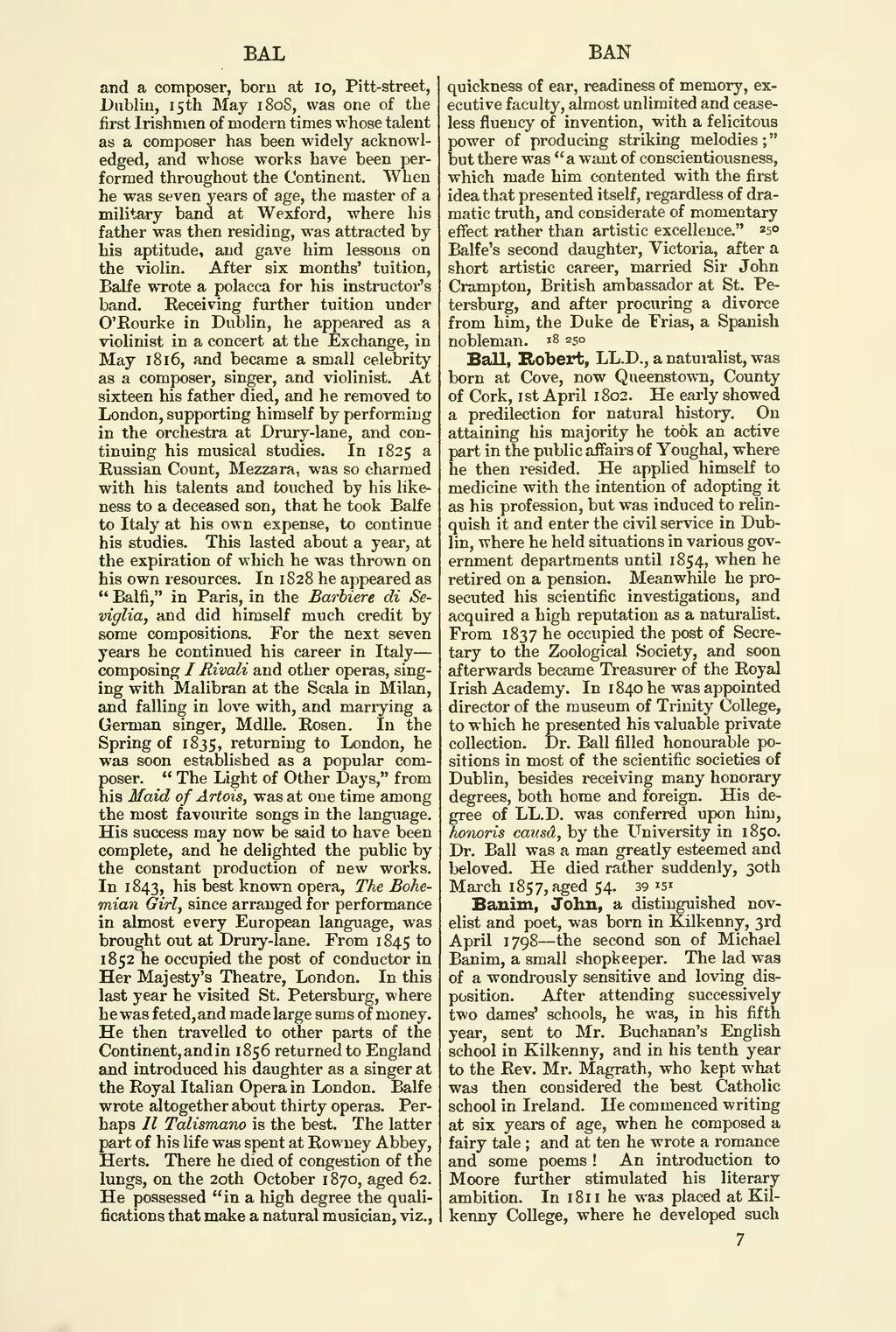and a composer, born at 10, Pitt-street, Dublin, 15th May 180S, was one of the first Irishmen of modern times whose talent as a composer has been widely acknowledged, and whose works have been performed throughout the Continent. When he was seven years of age, the master of a military band at Wexford, where his father was then residing, was attracted by his aptitude, and gave him lessons on the violin. After six months' tuition, Balfe wrote a polacca for his instructor's band. Receiving further tuition under O'Rourke in Dublin, he appeared as a violinist in a concert at the Exchange, in May 1816, and became a small celebrity as a composer, singer, and violinist. At sixteen his father died, and he removed to London, supporting himself by performing in the orchestra at Drury-lane, and continuing his musical studies. In 1825 a Russian Count, Mezzara, was so charmed with his talents and touched by his likeness to a deceased son, that he took Balfe to Italy at his own expense, to continue his studies. This lasted about a year, at the expiration of which he was thrown on his own resources. In 1828 he appeared as "Balfi," in Paris, in the Barbiere di Seviglia, and did himself much credit by some compositions. For the next seven years he continued his career in Italy — composing I Rivali and other operas, singing with Malibran at the Scala in Milan, and falling in love with, and marrying a German singer, Mdlle. Rosen. In the Spring of 1835, returning to London, he was soon established as a popular composer. "The Light of Other Days," from his Maid of Artois, was at one time among the most favourite songs in the language. His success may now be said to have been complete, and he delighted the public by the constant production of new works. In 1843, his best known opera. The Bohemian Girl, since arranged for performance in almost every European language, was brought out at Drury-lane. From 1845 to 1852 he occupied the post of conductor in Her Majesty's Theatre, London. In this last year he visited St. Petersburg, where he was feted, and made large sums of money. He then travelled to other parts of the Continent, and in 1856 returned to England and introduced his daughter as a singer at the Royal Italian Opera in London. Balfe wrote altogether about thirty operas. Perhaps Il Talismano is the best. The latter part of his life was spent at Rowney Abbey, Herts. There he died of congestion of the lungs, on the 20th October 1870, aged 62. He possessed "in a high degree the qualifications that make a natural musician, viz., quickness of ear, readiness of memory, executive faculty, almost unlimited and ceaseless fluency of invention, with a felicitous power of producing striking melodies;" but there was "a want of conscientiousness, which made him contented with the first idea that presented itself, regardless of dramatic truth, and considerate of momentary effect rather than artistic excellence." 250 Balfe's second daughter, Victoria, after a short artistic career, married Sir John Crampton, British ambassador at St. Petersburg, and after procuring a divorce from him, the Duke de Frias, a Spanish nobleman. 18 250
Ball, Robert, LL.D., a naturalist, was born at Cove, now Queenstown, County of Cork, 1st April 1802. He early showed a predilection for natural history. On attaining his majority he took an active part in the public affairs of Youghal, where he then resided. He applied himself to medicine with the intention of adopting it as his profession, but was induced to relinquish it and enter the civil service in Dublin, where he held situations in various government departments until 1854, when he retired on a pension. Meanwhile he prosecuted his scientific investigations, and acquired a high reputation as a naturalist. From 1837 he occupied the post of Secretary to the Zoological Society, and soon afterwards became Treasurer of the Royal Irish Academy. In 1840 he was appointed director of the museum of Trinity College, to which he presented his valuable private collection. Dr. Ball filled honourable positions in most of the scientific societies of Dublin, besides receiving many honorary degrees, both home and foreign. His degree of LL.D. was conferred upon him, honoris causâ, by the University in 1850. Dr. Ball was a man greatly esteemed and beloved. He died rather suddenly, 30th March 1857, aged 54. 39 151
Banim, John, a distinguished novelist and poet, was born in Kilkenny, 3rd April 1798—the second son of Michael Banim, a small shopkeeper. The lad was of a wondrously sensitive and loving disposition. After attending successively two dames' schools, he was, in his fifth year, sent to Mr. Buchanan's English school in Kilkenny, and in his tenth year to the Rev. Mr. Magrath, who kept what was then considered the best Catholic school in Ireland. He commenced writing at six years of age, when he composed a fairy tale; and at ten he wrote a romance and some poems! An introduction to Moore further stimulated his literary ambition. In 1811 he was placed at Kilkenny College, where he developed such
